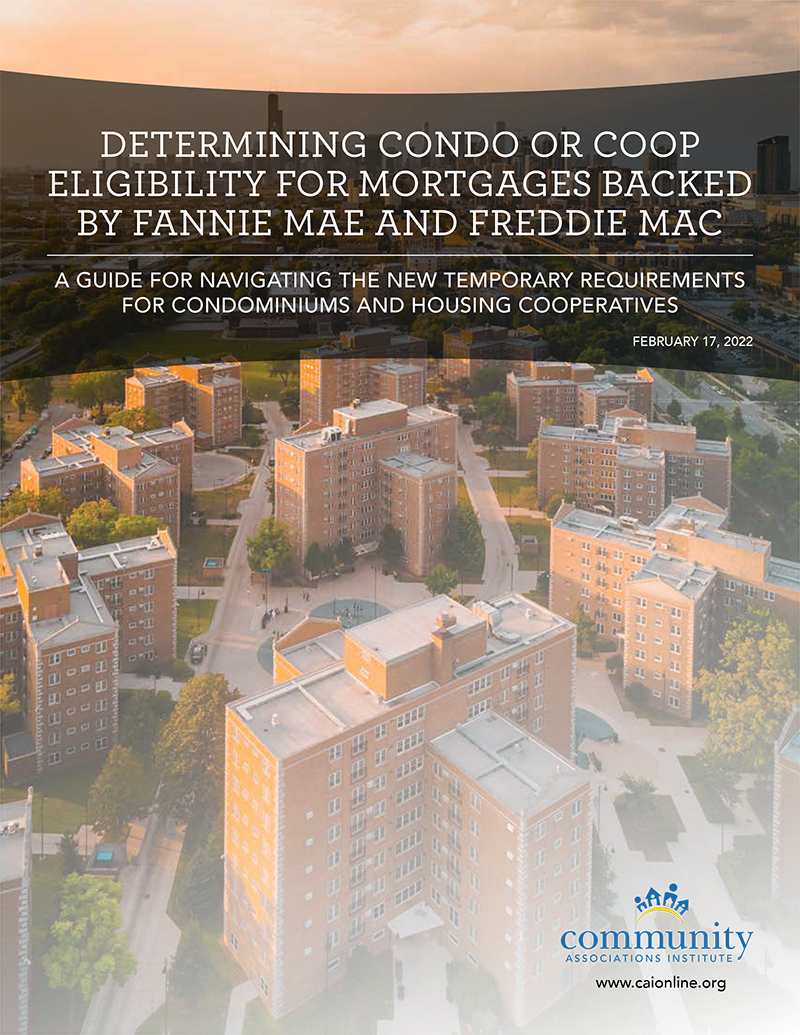CAI urges transparency in the Fannie Mae and Freddie Mac condo lending requirements
 The Community Associations Institute (CAI), the international leader for community association education, governance, and management, partnered with the Community Home Lenders of America (CHLA) and the National Association of Realtors (NAR) to voice concerns about the Fannie Mae and Freddie Mac condo lending guidelines in a June 21st letter to the Federal Housing Finance Agency (FHFA) director Sandra Thompson, Fannie Mae CEO Priscilla Almodovar, and Freddie Mac CEO Michael DeVito. FHFA oversees the mortgage financing companies.
The Community Associations Institute (CAI), the international leader for community association education, governance, and management, partnered with the Community Home Lenders of America (CHLA) and the National Association of Realtors (NAR) to voice concerns about the Fannie Mae and Freddie Mac condo lending guidelines in a June 21st letter to the Federal Housing Finance Agency (FHFA) director Sandra Thompson, Fannie Mae CEO Priscilla Almodovar, and Freddie Mac CEO Michael DeVito. FHFA oversees the mortgage financing companies.
According to Dawn Bauman, CAE, CAI’s senior vice president, government & public affairs, under FHFA’s conservatorship, Fannie Mae and Freddie Mac are set to release permanent guidelines that have been developed in secret with no public comment process. There is industry fear the guidelines will be even more restrictive than the temporary guidelines that have been in place since 2021 and result in more problems in the condominium and housing cooperative real estate market. CAI, CHLA and NAR believe the Federal Housing Finance Agency, Fannie Mae, and Freddie Mac should be transparent as they develop final lending requirements for condominiums and housing cooperatives.
“We are requesting transparency in the process of developing the final guidelines for condominium and housing cooperative lending requirements,” write the three trade groups in the letter. “We also ask for the opportunity for public comment on these important lending policy positions impacting millions of Americans’ ability to buy and sell a condominium or housing cooperative unit.”
In their letter the organizations are requesting that:
• Any changes to enterprise condo project or loan approval requirements should be subject to a public comment period of at least 60 days prior to adoption.
• Fannie Mae should be required to make public their lists of condo projects ineligible for loan purchase, along with guidance as to the actions necessary to make them eligible.
“Our organizations are very concerned that the government-sponsored enterprises’ (GSE) condominium and housing cooperative lending requirements will restrict access to housing for many Americans while making it very difficult for current owners to build wealth and maintain their property values,” the letter states. “At a time when there is a heightened awareness and increased emphasis on building maintenance, restricting access to lending will plummet property values, leaving less money and incentive for homeowners to invest in maintenance, especially in urban opportunity zones throughout the U.S.”
Fannie Mae and Freddie Mac updated their lending requirements in response to the Champlain Towers South condominium collapse in Surfside, Fla., in June 2021 that killed 98 people. CAI, CHLA, and NAR support safe buildings for American homeowners as well as public policy that leads to safe buildings, but they believe the requirements have been too restrictive. The organizations urge FHFA, Fannie Mae, and Freddie Mac to narrow the focus of the requirements to buildings that are at risk based on data.
“We stand ready to work with the government-sponsored enterprises (GSE) and FHFA to develop and implement policy to keep Americans safe in their buildings while having appropriate access to lending for their homes,” write the trade groups.
The letter was also sent to the Senate Banking Committee and the House Financial Services Committee and their staff members. If you are experiencing delays or denials in mortgage lending in your condominium building(s), please contact your Member of Congress using the CAI call-to-action system at https://www.votervoice.net/CAI/Campaigns/103298/Respond and let them know the details.
In February, CAI developed a guidance document “Determining Condo or Coop Eligibility for Mortgages Backed by Fannie Mae and Freddie Mac, A Guide for Navigating the New Temporary Requirements for Condominiums and Housing Cooperatives” to help homeowner leaders and community managers navigate the current lending requirements in their communities.
A copy of the June 21st letter and publication are available at www.caionline.org.
Mount Vernon Co. acquires John Carver Inn & Spa in Plymouth, MA


Recently passed legislation creates opportunities to meet CT’s changing energy needs - by Klein and Feinn

Selecting the right façade installation firm - by Steven Powell


.png)





.png)
